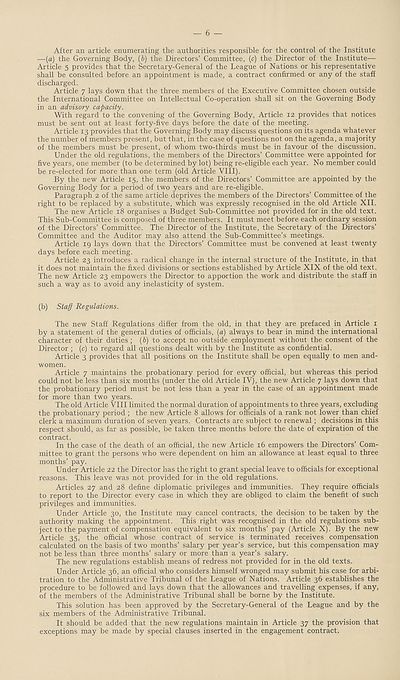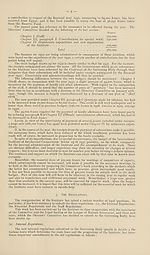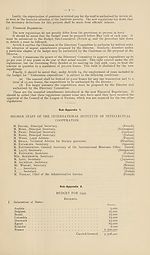International > Report of the Governing body of the International Institute of Intellectual Co-operation > 1931
(6)
Download files
Complete book:
Individual page:
Thumbnail gallery: Grid view | List view

— 6
After an article enumerating the authorities responsible for the control of the Institute
—{a) the Governing Body, (b) the Directors’ Committee, (c) the Director of the Institute—
Article 5 provides that the Secretary-General of the League of Nations or his representative
shall be consulted before an appointment is made, a contract confirmed or any of the staff
discharged.
Article 7 lays down that the three members of the Executive Committee chosen outside
the International Committee on Intellectual Co-operation shall sit on the Governing Body
in an advisory capacity.
With regard to the convening of the Governing Body, Article 12 provides that notices
must be sent out at least forty-five days before the date of the meeting.
Article 13 provides that the Governing Body may discuss questions on its agenda whatever
the number of members present, but that, in the case of questions not on the agenda, a majority
of the members must be present, of whom two-thirds must be in favour of the discussion.
Under the old regulations, the members of the Directors’ Committee were appointed for
five years, one member (to be determined by lot) being re-eligible each year. No member could
be re-elected for more than one term (old Article VIII).
By the new Article 15, the members of the Directors’ Committee are appointed by the
Governing Body for a period of two years and are re-eligible.
Paragraph 2 of the same article deprives the members of the Directors’ Committee of the
right to be replaced by a substitute, which was expressly recognised in the old Article XII.
The new Article 18 organises a Budget Sub-Committee not provided for in the old text.
This Sub-Committee is composed of three members. It must meet before each ordinary session
of the Directors’ Committee. The Director of the Institute, the Secretary of the Directors’
Committee and the Auditor may also attend the Sub-Committee’s meetings.
Article 19 lays down that the Directors’ Committee must be convened at least twenty
days before each meeting.
Article 23 introduces a radical change in the internal structure of the Institute, in that
it does not maintain the fixed divisions or sections established by Article XIX of the old text.
The new Article 23 empowers the Director to apportion the work and distribute the staff in
such a way as to avoid any inelasticity of system.
(b) Staff Regulations.
The new Staff Regulations differ from the old, in that they are prefaced in Article 1
by a statement of the general duties of officials, [a) always to bear in mind the international
character of their duties ; (6) to accept no outside employment without the consent of the
Director ; (c) to regard all questions dealt with by the Institute as confidential.
Article 3 provides that all positions on the Institute shall be open equally to men and-
women.
Article 7 maintains the probationary period for every official, but whereas this period
could not be less than six months (under the old Article IV), the new Article 7 lays down that
the probationary period must be not less than a year in the case of an appointment made
for more than two years.
The old Article VIII limited the normal duration of appointments to three years, excluding
the probationary period ; the new Article 8 allows for officials of a rank not lower than chief
clerk a maximum duration of seven years. Contracts are subject to renewal; decisions in this
respect should, as far as possible, be taken three months before the date of expiration of the
contract.
In the case of the death of an official, the new Article 16 empowers the Directors’ Com¬
mittee to grant the persons who were dependent on him an allowance at least equal to three
months’ pay.
Under Article 22 the Director has the right to grant special leave to officials for exceptional
reasons. This leave was not provided for in the old regulations.
Articles 27 and 28 define diplomatic privileges and immunities. They require officials
to report to the Director every case in which they are obliged to claim the benefit of such
privileges and immunities.
Under Article 30, the Institute may cancel contracts, the decision to be taken by the
authority making the appointment. This right was recognised in the old regulations sub¬
ject to the payment of compensation equivalent to six months’ pay (Article X). By the new
Article 35, the official whose contract of service is terminated receives compensation
calculated on the basis of two months’ salary per year’s service, but this compensation may
not be less than three months’ salary or more than a year’s salary.
The new regulations establish means of redress not provided for in the old texts.
Under Article 36, an official who considers himself wronged may submit his case for arbi¬
tration to the Administrative Tribunal of the League of Nations. Article 36 establishes the
procedure to be followed and lays down that the allowances and travelling expenses, if any,
of the members of the Administrative Tribunal shall be borne by the Institute.
This solution has been approved by the Secretary-General of the League and by the
six members of the Administrative Tribunal.
It should be added that the new regulations maintain in Article 37 the provision that
exceptions may be made by special clauses inserted in the engagement contract.
After an article enumerating the authorities responsible for the control of the Institute
—{a) the Governing Body, (b) the Directors’ Committee, (c) the Director of the Institute—
Article 5 provides that the Secretary-General of the League of Nations or his representative
shall be consulted before an appointment is made, a contract confirmed or any of the staff
discharged.
Article 7 lays down that the three members of the Executive Committee chosen outside
the International Committee on Intellectual Co-operation shall sit on the Governing Body
in an advisory capacity.
With regard to the convening of the Governing Body, Article 12 provides that notices
must be sent out at least forty-five days before the date of the meeting.
Article 13 provides that the Governing Body may discuss questions on its agenda whatever
the number of members present, but that, in the case of questions not on the agenda, a majority
of the members must be present, of whom two-thirds must be in favour of the discussion.
Under the old regulations, the members of the Directors’ Committee were appointed for
five years, one member (to be determined by lot) being re-eligible each year. No member could
be re-elected for more than one term (old Article VIII).
By the new Article 15, the members of the Directors’ Committee are appointed by the
Governing Body for a period of two years and are re-eligible.
Paragraph 2 of the same article deprives the members of the Directors’ Committee of the
right to be replaced by a substitute, which was expressly recognised in the old Article XII.
The new Article 18 organises a Budget Sub-Committee not provided for in the old text.
This Sub-Committee is composed of three members. It must meet before each ordinary session
of the Directors’ Committee. The Director of the Institute, the Secretary of the Directors’
Committee and the Auditor may also attend the Sub-Committee’s meetings.
Article 19 lays down that the Directors’ Committee must be convened at least twenty
days before each meeting.
Article 23 introduces a radical change in the internal structure of the Institute, in that
it does not maintain the fixed divisions or sections established by Article XIX of the old text.
The new Article 23 empowers the Director to apportion the work and distribute the staff in
such a way as to avoid any inelasticity of system.
(b) Staff Regulations.
The new Staff Regulations differ from the old, in that they are prefaced in Article 1
by a statement of the general duties of officials, [a) always to bear in mind the international
character of their duties ; (6) to accept no outside employment without the consent of the
Director ; (c) to regard all questions dealt with by the Institute as confidential.
Article 3 provides that all positions on the Institute shall be open equally to men and-
women.
Article 7 maintains the probationary period for every official, but whereas this period
could not be less than six months (under the old Article IV), the new Article 7 lays down that
the probationary period must be not less than a year in the case of an appointment made
for more than two years.
The old Article VIII limited the normal duration of appointments to three years, excluding
the probationary period ; the new Article 8 allows for officials of a rank not lower than chief
clerk a maximum duration of seven years. Contracts are subject to renewal; decisions in this
respect should, as far as possible, be taken three months before the date of expiration of the
contract.
In the case of the death of an official, the new Article 16 empowers the Directors’ Com¬
mittee to grant the persons who were dependent on him an allowance at least equal to three
months’ pay.
Under Article 22 the Director has the right to grant special leave to officials for exceptional
reasons. This leave was not provided for in the old regulations.
Articles 27 and 28 define diplomatic privileges and immunities. They require officials
to report to the Director every case in which they are obliged to claim the benefit of such
privileges and immunities.
Under Article 30, the Institute may cancel contracts, the decision to be taken by the
authority making the appointment. This right was recognised in the old regulations sub¬
ject to the payment of compensation equivalent to six months’ pay (Article X). By the new
Article 35, the official whose contract of service is terminated receives compensation
calculated on the basis of two months’ salary per year’s service, but this compensation may
not be less than three months’ salary or more than a year’s salary.
The new regulations establish means of redress not provided for in the old texts.
Under Article 36, an official who considers himself wronged may submit his case for arbi¬
tration to the Administrative Tribunal of the League of Nations. Article 36 establishes the
procedure to be followed and lays down that the allowances and travelling expenses, if any,
of the members of the Administrative Tribunal shall be borne by the Institute.
This solution has been approved by the Secretary-General of the League and by the
six members of the Administrative Tribunal.
It should be added that the new regulations maintain in Article 37 the provision that
exceptions may be made by special clauses inserted in the engagement contract.
Set display mode to:
![]() Universal Viewer |
Universal Viewer | ![]() Mirador |
Large image | Transcription
Mirador |
Large image | Transcription
Images and transcriptions on this page, including medium image downloads, may be used under the Creative Commons Attribution 4.0 International Licence unless otherwise stated. ![]()
| League of Nations > International > Report of the Governing body of the International Institute of Intellectual Co-operation > 1931 > (6) |
|---|
| Permanent URL | https://digital.nls.uk/195306422 |
|---|
| Attribution and copyright: |
|
|---|---|
| Shelfmark | LN.XII.3 |
|---|---|
| Shelfmark | LN.XII |
|---|
| Description | Over 1,200 documents from the non-political organs of the League of Nations that dealt with health, disarmament, economic and financial matters for the duration of the League (1919-1945). Also online are statistical bulletins, essential facts, and an overview of the League by the first Secretary General, Sir Eric Drummond. These items are part of the Official Publications collection at the National Library of Scotland. |
|---|---|
| Additional NLS resources: |
|

